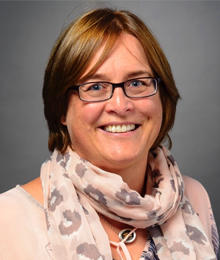An interview with Professor Geraldine Butler
October 2020
Geraldine Butler is Professor in the School of Biomolecular and Biomedical Science at University College in Dublin. She is also a member of the Microbiology Society and is organising and chairing the Candida and Candidiasis 2021 meeting. In this interview, she tells us more about her research and why she thinks microbiology matters.

What is your role and area of research?
I am a Professor in the School of Biomolecular and Biomedical Science at University College Dublin, with a background in genetics and eukaryotic microbiology. My group studies the evolution and virulence of yeasts, particularly those that are pathogenic and are part of the Candida clade.
Why is your research important?
Fungi are major causes of infection, yet they tend to be understudied. Recent estimates suggest that more than three million people across the globe are infected by fungi and more than one million people die a year. Approximately 750,000 have invasive candidiasis. On the other hand, fungi are an important part of the environment, as symbionts and decomposers.
We use genomic methods to study virulence of Candida species. For example, in a recent collaboration co-ordinated by Memorial Sloan Kettering Cancer Center, we showed that Candida parapsilosis can move from the intestine to cause bloodstream infections in recipients of allogeneic hematopoietic cell transplants. We also study the origins of yeast species.
Sequencing genomes of many isolates of the same species has revealed that some result from hybridisation or mating between related but not identical parents. It is possible that hybridisation may be related to virulence. We are therefore collecting environmental isolates of some pathogenic species, like Candida tropicalis and Candida parapsilosis.
In other studies, we are characterizing isolates of many environmental yeasts, collected from soil around Ireland. We have recruited some primary school children to help in the collection and the identification of genome analysis, which is being carried out by undergraduates. I think it is important that undergraduates experience real research approaches and methodologies, and that children of all ages learn about biodiversity.
What are the challenges you face in your work and how do you try to overcome them?
My field of research requires a combination of microbiological and bioinformatic/computational approaches. It is difficult to find people that are skilled in both. I have taught myself some bioinformatics, and I try to recruit both bioinformaticists and lab scientists. I have contributed to two PhD programmes that specifically address the lack of computational biologists, and I have helped to develop training modules for undergraduate biologists. The main challenge comes from a lack of research funding, which affects microbiologists everywhere. I try to emphasise the training aspect of my work – many of my ex-PhD students now work in bioinformatic analysis of cancer genomes. The only option is to apply everywhere possible for research funding. This has led to some nice collaborations, for example a member of an EU-supported Innovating Training Network for early career researchers.
Why is it important to be a member of an organisation like the Microbiology Society?
There are relatively few yeast biologists in Ireland, and the Microbiology Society provides an invaluable resource for keeping in touch with ongoing research in the UK and elsewhere. The Society has helped to host the 2019 Irish Fungal Society meeting, and in March 2021, the Microbiology Society are organising a virtual Candida and Candidiasis 2021 meeting. I will be chairing this meeting. The Society has been invaluable, helping the Candida community to launch this extremely important conference.
In the past, the Society has been essential for my PhD students, providing travel grants and opportunities to speak at local conferences, and it has provided very welcome summer studentships, allowing undergraduates to obtain research experience.
Why does microbiology matter?
Microbes are everywhere! Some estimates suggest that there are more microbes in a teaspoon of soil than there are people on earth. My focus is on eukaryotic microbes, which range from mutualists to decomposers and pathogens. Studying fungal diseases of humans is important, but on a larger scale, pathogenic fungi are probably the major cause of host loss, leading to the possible extinction of some bats.
Fungal plant pathogens are responsible for major losses in food production. On the other hand, without fungi, we wouldn’t have beer, bread or most cheese. Human association with the yeast Saccharomyces cerevisiae dates to before 6000 BCE. Without fungi, we have no soil and no agriculture.


